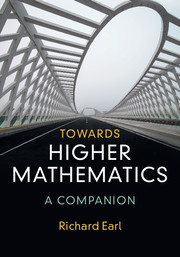I - Introduction
Published online by Cambridge University Press: 03 October 2017
Summary
Mathematics in Higher Education
So where is mathematics going to take you in the next few years? This is an entirely reasonable question if you're thinking about committing to a degree in maths or the physical sciences in the short-term future. This might also be a good time to ask yourself why you enjoy maths, or what it is about the subject that generates that enjoyment.
Mathematics within higher education (whether studied solely, or as a joint degree, or as a means to investigate some cognate discipline) will be more varied in its theory and applications than the subject you have so far met at school or college. Much of it will be more challenging, possibly more so initially, but challenging aspects will remain. Further, the expected mode of learning, and the range of abilities of the students around you, could well be very different from your current experiences. All of which may sound a little daunting.
You can imagine that the increased variety now offered by the subject is largely welcomed by students. There is no particular downside to this, save that some students may find themselves spoilt for choice when it comes to selecting options. The increased challenge in the content, and the emphasis on more independent learning, need considerable effort to become habit. But these are not challenges unique to mathematics, and are largely the point of higher education.
Julia Robinson is pictured at the start of this introduction. She was the first female president of the AMS – the American Mathematical Society – and made significant contributions to number theory, though any reading of her biography (Reid [25]) will make clear her modesty, awkwardness in the limelight, and desire to be remembered for her mathematical contributions rather than record-making firsts. The quote accompanying her photo above is a response she made to the personnel department at Berkeley when asked to describe her average week and I include it here to encourage reflection on what sort of week Julia was having as she wrote that.
A life spent researching mathematics is at some orders of magnitude removed from the undergraduate experience; however, they do have some flavours in common.
Information
- Type
- Chapter
- Information
- Towards Higher Mathematics: A Companion , pp. 1 - 7Publisher: Cambridge University PressPrint publication year: 2017
